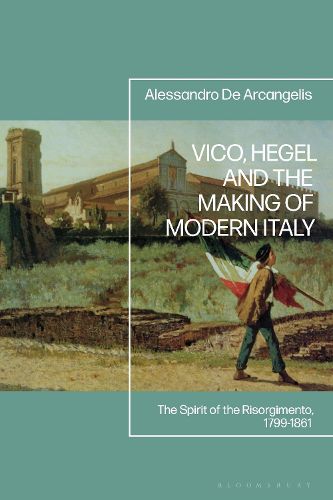Readings Newsletter
Become a Readings Member to make your shopping experience even easier.
Sign in or sign up for free!
You’re not far away from qualifying for FREE standard shipping within Australia
You’ve qualified for FREE standard shipping within Australia
The cart is loading…






Embracing a transnational approach to 19th-century Italian intellectual history, this book examines the encounter and amalgamation of local and foreign philosophical traditions, chiefly represented by the thought of Giambattista Vico and Georg Wilhelm Friedrich Hegel, showcasing their contribution to shaping a historical mindset that guided and legitimised Italians' experiences of political change. Taking a revisionist stance, the author challenges the prevailing view that Italian thinkers passively adopted foreign ideas. Instead, they engaged critically with them, questioning their conceptual foundations and applicability to Italy's political landscape. Vico, Hegel and the Making of Modern Italy reveals that Italian intellectuals sought cultural and political renewal, at both local and European levels, not through assimilation but through steadfast allegiance to a local strand of political thought inspired by Vico's humanist historicism. The book ultimately explores how philosophical thought empowered Italian intellectuals to navigate the uncertainties, drama, and energy of the Risorgimento, underscoring the enduring significance of philosophical knowledge in shaping Italy's political trajectory.
$9.00 standard shipping within Australia
FREE standard shipping within Australia for orders over $100.00
Express & International shipping calculated at checkout
Embracing a transnational approach to 19th-century Italian intellectual history, this book examines the encounter and amalgamation of local and foreign philosophical traditions, chiefly represented by the thought of Giambattista Vico and Georg Wilhelm Friedrich Hegel, showcasing their contribution to shaping a historical mindset that guided and legitimised Italians' experiences of political change. Taking a revisionist stance, the author challenges the prevailing view that Italian thinkers passively adopted foreign ideas. Instead, they engaged critically with them, questioning their conceptual foundations and applicability to Italy's political landscape. Vico, Hegel and the Making of Modern Italy reveals that Italian intellectuals sought cultural and political renewal, at both local and European levels, not through assimilation but through steadfast allegiance to a local strand of political thought inspired by Vico's humanist historicism. The book ultimately explores how philosophical thought empowered Italian intellectuals to navigate the uncertainties, drama, and energy of the Risorgimento, underscoring the enduring significance of philosophical knowledge in shaping Italy's political trajectory.